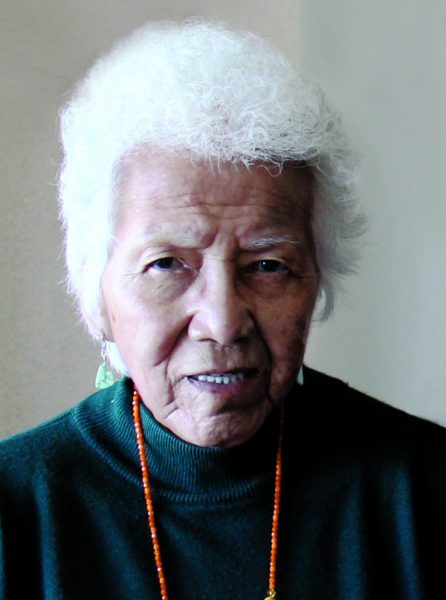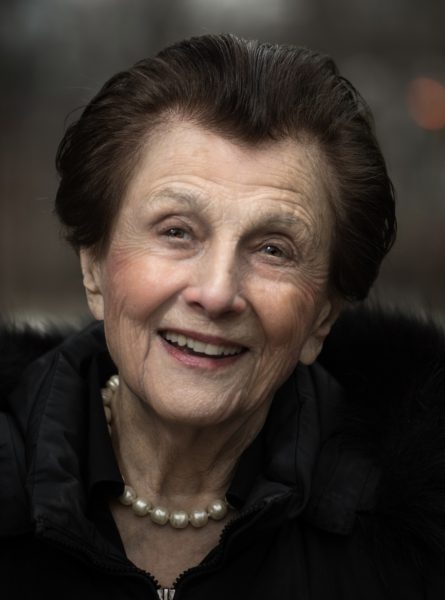Two survivors share insights and wisdom with students
This spring, as the COVID-19 pandemic changed the way students learned and the way their accomplishments and graduation are being celebrated, Thompson Rivers University is conferring honorary doctorate degrees upon two outstanding women who share remarkable resilience in overcoming traumatic experiences in their lives. The virtual celebration is set for June 22.
Mona Jules and Vera Schiff were born on different continents and have lived very different lives. But both have faced life-changing adversity when they were young that deeply affected them and their perspectives.
Jules, an Elder with the Simpcw First Nation near Barriere, went through the residential school system. She has spent much of her life teaching and preserving the Secwepemcstín language—the language she and other children were not allowed to speak for fear of punishment.
Schiff was born in Czechoslovakia and watched her family members die—including her parents—in Nazi concentration camps during the Second World War. She has written books about her experiences and lobbied for justice and human rights.
They congratulated students for reaching their graduation milestone and reminded them that more achievements await.

“You have accomplished one very important goal in your life, completing your post-secondary education, raising the bar for you and your family. . . . As you begin the next phase of your life, remain close to your families and to your community, especially during these uncertain times. Your future is sure to be brighter,” said Jules.
“Focus and concentrate on your chosen field, maintain an open mind and a desire to learn more. You have to be aware that you are the leaders of tomorrow. You need to apply your knowledge to the benefit of society, yourself and the whole world. The hard work you invested into your education will bring dividends, not only to you, but will have a lasting impact on the future of mankind,” Schiff said.
They offered advice to students that came from their hearts and their experiences.
“As you continue your journey in life, remember the old saying: When the going gets rough, the tough get going. I wondered about that as a youngster. Then I decided that you do not give up on your plan just because it is too difficult,” said Jules.
“Mankind is capable of great good and or evil. Don’t lose faith in humanity and try to add empathy and compassion in your daily work and life,” said Schiff.

They urged young people to be aware of global problems and to do their part to improve the world.
“Young people should be aware of how small the world is becoming. People of the world are now living in close proximity to one another and we must appreciate Canadian freedom and uphold Canadian civil rights that accept all, regardless of colour,” said Jules.
Schiff appealed for the next generations to regard the state of the environment.
“Youth of this world should be aware of their responsibility towards the planet, as well as society. We have to be mindful of damages caused by excessive carbon imprint and watch the climate change. We should also be aware that we share this earth with others, and that we should keep keen eyes and foster positive relationships between different races,” she said.
Everyone has potential
They both reminded students that they can have an impact on the world.
“Never believe that you don’t make a difference. Every single one of us is important; we have diverse talents, all of which are important to mankind’s future. Every individual can and should make contributions to society, help to improve on conditions around us. You should not ignore your potential—we all can give and live a happy, useful life,” said Schiff.
“All you have to do is to look around, analyze your aptitudes, don’t be afraid to be an outlier. And never overlook or miss where there is a need to help, for there are among us many weaker, less-fortunate individuals who need a helping hand.”
Jules pointed out that during the pandemic, the people making the biggest difference are not the ones who usually get the spotlight, such as nurses and teachers, but also carpenters and farmers, to name a few.
During the challenges she has faced, Jules has turned to her spirituality.
“What has kept me going through so many difficult times in my life has been my spirituality. The Secwépemc people call God Our Creator—he is one and the same.”
Schiff said during the Holocaust, she was driven by a sense of duty to her family. Afterward, she struggled for a while until she focused on reminding the world what happened. Gradually, her faith in humanity returned.
“I realized that I have a duty to bear witness about the brutal crimes committed on my family as well as on many innocent defenceless people. I felt compelling duty to let the world know about the brutality inflicted on my folks and Jews in general,” she said.
“As my own healing progressed, I met some great individuals who helped restore my faith in mankind. I recouped my admiration for the achievements of men in diverse fields of endeavour, science, art, music, and much else. I relearned to love and admire humanity, realizing the enormous potential we have.”
A tablecloth that meant everything
Schiff shared a deeply personal story that she rarely talks about. It happened shortly after the war, when she had returned to Prague.
“One evening, as I sat alone in my small roomette, I heard a knock on my door. Outside stood an elderly, hunched woman. She carried a shabby suitcase. I didn’t know who she was, but she addressed me hurriedly: Your mom left this tablecloth with my sister Betty and asked her to keep it safe, as it was part of your sister’s dowry. Betty died and I want you to have it, as it is you who lost everybody and everything.
“She quickly left before I had a chance to ask her anything, leaving the worn suitcase on my doorstep. I knew what was inside; it was a crocheted tablecloth that was supposed to be a part of my sister’s trousseau.
“That elderly, hunched woman made a world of difference in my life. Few people bothered to return property stolen from Jews during the war, but this obviously hard-up person had the integrity, compassion and honesty to bring the precious handiwork back to me.
“I perceive this set of tablecloths made by my mom as one of the most precious items I own. Every now and then I open the package, touch the laces and feel almost as if the caress was the hand of my late mom.”

